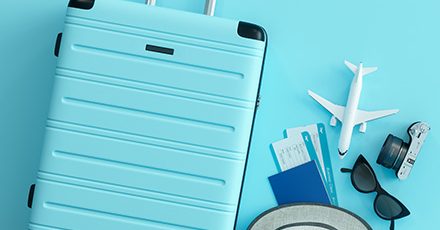Why do holidays play chaos with their POO habits? An expert explains how to prevent it
Next you will find out How much fiber should you eat per dayPresent What are probiotics and what do you do? And What intestinal health really means.
What digestive problems are common on vacation – and how to help
1. Constipation
Travel can lead temporarily constipation. You probably have an idea of the symptoms, but it is worth knowing the specific medical definition:
- Their stool passages (chair) are less common (below three times a week)
- Colon movements are difficult and/or painful
- Chairs can be dry, hard or lumpy
This problem usually solves within three weeks. If the constipation runs longer (so that your bowel movement remains limited to three times or less per week), you should consult your family doctor.
“Constipation is one of the The most common indigestion When traveling, and that is largely due to changes in the routine, ”says Dr. Rossi.
“Various factors are involved, from Sleep and various meals to Reduced fiber intake And DehydrationAll of this can slow down the intestinal engine. We also tend to eat more and move On vacation, which doesn’t help. “
Dr. Rossi recommends a certain means for constipation and diarrhea: “If you experience constipation or loose bowel movements, you should take something Psyllium remember With you, ”she says.
“This water -loving fiber (available in most health shops) has a double effect and also helps to make hard chairs too soft Thickening of loose chairs. Try ½ tablespoon (3 g) mixed in 150 ml of water (per tablespoon) per day.
“I also know that it is obvious, but remember to stay hydrated both during the flight and during the way. Dehydration is a common cause of vacation -induced constipation.”
Possible means:
- Fiber food – Plum and psyllium seed shells are particularly recommended
- Drink a lot of water to avoid an excessive hard chair, especially during the flights
- Movement and movement can loosen things
2. Diarrhea
Diarrhea is a common problem for travelers who may find out:
- Loose chair
- Dehydration
- Vomiting (in some cases)
“Stomach bug merchant as a” travel belly “describes a well-known problem and they are usually a result of the exposure unknown microbes In food or water, ”says Dr. Rossi.
“Although some microbes can be ‘bad’ by nature, our intestine can adapt to it in many cases, which is why locals can enjoy street food and local tap water without hesitation, but often often the same foods often Cause. “”
Diarrhea is typically caused by food poisoning or stomach bugs, and the seriousness of the problem and its treatment depend on the cause.
Loose chair can also be caused by other factors, such as: Overexposition of the suneat rich foods, excessive drinking Or eat food, opposite you can be intolerant, such as pasta and bread.
As mentioned in the section on constipation, Psyllium Husk is a popular remedy for the treatment of loose chairs. The NHS also recommends Medicines such as Loperamide or Diphenoxylate as well as atropine.
Due to the water loss associated with this condition, drinking is a lot of liquids to prevent dehydration.
Possible means:
- Take the psyllium shell to thicken chairs
- Consider anti-diarrhea medications (with a pharmacist or a doctor)
- Drink a lot of water to reduce dehydration
3. Digestion disorders and other frequent problems
These are a number of other common indigestion that can arise during the trip:
- Digestive disorders
- flatulence
- Travel sickness
These different problems have different causes, possibly including the selected means of transport. According to Dr. Rossi can be particularly problematic for the digestive system.
“Have you ever noticed that your stomach felt bloated in the middle of a flight? That is because of it Gas enclosed in its intestine is expanded. It is the same reason why her ears and crispy packing balloons are popping, ”she says.
“I call the ‘kilometer high IBS’, and it can be a real problem for those who are already susceptible to intestinal sensitivity.”
Movement disease is obviously also connected to travel. Most of the ferry and cars are often problematic Means of transport in this regard.
In the meantime, digestive disorders often result from the food of rich foods.
Possible means:
- Avoid richer foods (At least some time) during your vacation can limit digestive disorders
- Stand And stretching your legs can help with flatulence in flight
- Travel sickness can be reduced by sitting in the front seat of a car or in the middle of a boat
How to prevent digestive problems on vacation before they take place
Prevention is always better than healing, as it becomes clear when you run from the pharmacy to toilets in a foreign country. In this sense we asked Dr. Rossi for her tips in front of the takeoff.
“Focus on building a diverse – and thus resistant – community of intestinal microbes through diet before your vacation, as this optimizes your intestinal health and Could reduce your risk of intestinal infections“, She says.
“Studies show that people with more diverse intestinal microbes are Experience less likely Travel -poor intestinal symptoms, including belly of travelers. “
Certain foods can contribute to good bacteria to a healthy intestinal microbioma. Some of the delicious options are Greek yogurt, kimchi, kombucha and sauerkraut. Bacterial preparations are another way to give your intestinal microbiome a targeted charge.
“There is good Clinical evidence To show that a certain probiotic tribe, LGG (Lactobacillus Rhamnosus GG), the risk of a travel belly reduces considerably ” LGG bacteria supplement. “It is best to take it seven days before and during her trip and seven days after her return,” she adds.
Dr. Rossi also recommends eating a wide range of fruit and vegetables in the run -up to the trip.
“Having the goal 30 or more different types of plants A week in the six main plants: vegetables, fruit, whole grain, legumes (beans and impulses), nuts and seeds as well as herbs and spices, ”she advises.
If you have a story of digestive problems when flying, there are certain foods that can best be avoided.
“You can benefit from making it easy for yourself Fodmaps (A group of fermentable carbohydrates in food such as onions, garlic and certain fruits) in the 24-48 hours before the start, ”says Dr. Rossi.
“Remember to introduce these foods back into your diet as soon as you have landed because many Fodmaps are prebiotic and help to feed your advantageous intestinal microbes.”
As soon as you have reached your goal, Dr. Rossi to synchronize her lifestyle with his time zone as soon as possible.
“The adaptation of the time of meals and sleep helps your intestine to calm down faster, because yours Microbioma is closely connected to her circadian rhythm“, She says.
Should you worry if you get a bad belly on vacation?
It is uncomfortable to have digestive problems on vacation, but mostly it is not something you have to worry about. After certain cases require an investigation.
“Occasional loose chairs or mild constipation usually do not cause any reason to worry, but there are definitely red flags that you have to pay attention to,” says Dr. Rossi.
“If diarrhea takes more than 48 hours or if you have a high fever, continued vomiting, blood in your chair or Signs of dehydration (Like dizziness or dark urine) it is important to seek medical help. The same applies to severe abdominal pain – they are better safe as an excuse. “
The large silver strip here is that a vacation could possibly do more good than damage to your digestive system.
“If you go somewhere and have time to relax that Reduction of stress and cortisol can have a positive effect on your intestinal health, ”says Dr. Rossi.
“In addition, you may be able to expose yourself to a larger selection of food (both fermented and different plants) than normally at home.”
Now try:
Something to eat and drink in a heat wave
Top health benefits of plums and plum juice
Why am I clogged?
What is food poisoning?
All health content on goodfood.com is only provided for general information and should not be treated as a replacement for the medical advice of your own doctor or another medical specialist. If you have concerns about your general health, you should contact your local health service provider. For more information, see our website conditions.







